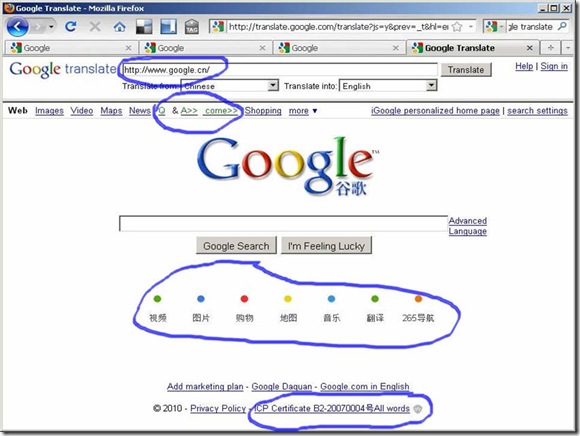Thanks for Professor Urs Gasser’s invitation. I am allowed to sit in his course of “Online Law and Business in a Globalized Economy” at Harvard Law School, and get an opportunity to present some understanding to Chinese websites. Because of the limited time slot, I just partly introduced the slides in the class. Therefore, here is a more comprehensive version for those who are interested in.
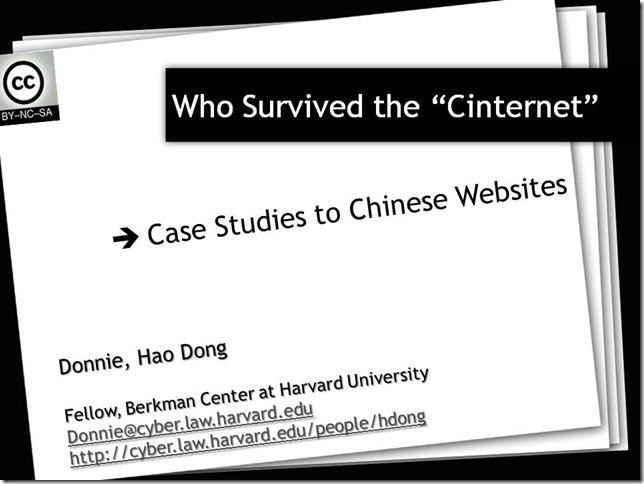
Hillary Clinton said that “We stand for a single Internet where all of humanity has equal access to knowledge and ideas.” I love this vision, but it is not a truth of the Internet. 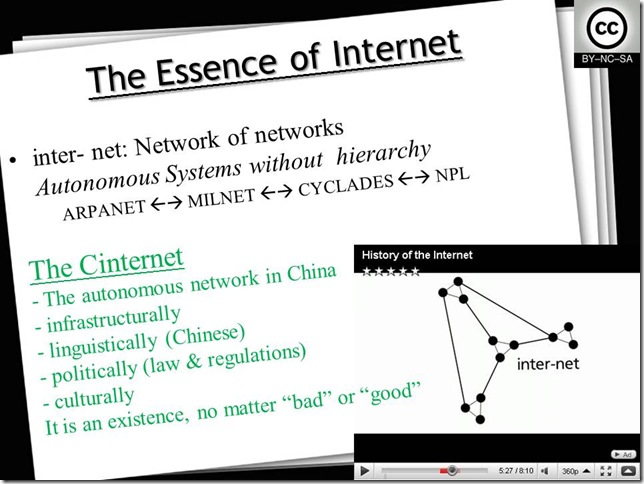
It is untrue not only because the dicky openness of a specific network may be destroyed abruptly (The Internet access in Xinjiang, a northwest region in China three times bigger than Califonia, was simply cut out over 6 months after the mob riot and bloody fight between nationalities), but also because the essence of the Internet: It is inter-net, the Network of Networks. It can be described as an information transmission/communication network composed of many autonomous systems. ARPANET, MILNET, Cyclades (France) and NPL (UK) formed the first generation of the Internet (see the video). More autonomous systems then have been setup and joined the Internet – They joined the Internet by accepting the TCP/IP and other protocols. But this does not mean that they have the same policy on the authority to access and the attitude to the network security.
Similiarly, I name the concept of “Cinternet” to the autonomous network in China. It could be isolated from the other parts of the Internet infrastructurally, linguistically, politically and even culturally. Recently, the trend of such isolation seems jumped from the level of technological blocking to the level of institutional denying. Contrast to Hillary’s vision, this seems to be an existence, no matter “bad” or “good”. It is there.
A Video on the History of the Internet [http://www.youtube.com/watch?v=9hIQjrMHTv4 ]:

Google announced that it will not go on filtering the results of web search because it’s E-mail service is attacked. The logic is not that straight forward, but it works at least on emphasizing the not evil slogan. In my view, it is not only the said attacking, but also the anxiety of the culture shock lead Google’s activities. Google is still using its American imagination: fight or obedient, agree or disagree.
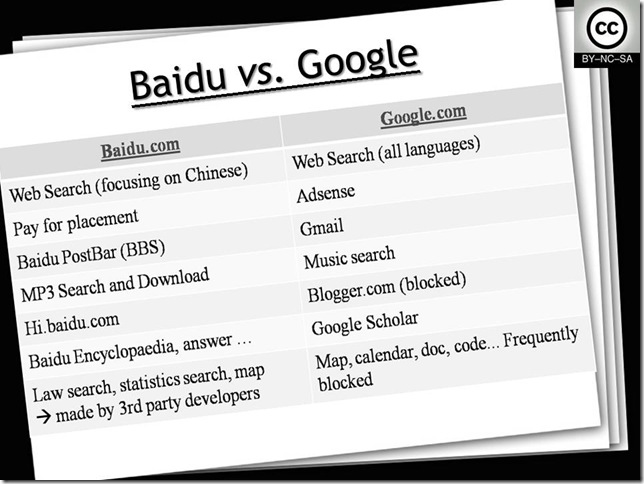
Let’s back to the business. Google’s anxiety in China (as well as Yahoo!’s leaving) may be reasoned by the wrongful understanding to Chinese netizens’ demands and surfing usage, which reflect the Chinese culture and social structure.
Let’s start from a comparision between Baidu.com and Google.com:
Besides the advantage of focusing on the Chinese search engine, Baidu has the totally differenct philosophy from Google. Baidu runs pay for placement service (if you pay for some keywords, your link will be among the first few items of the search result of those keywords, with an “Ads” symbol), while google earns money mainly from Adsense (An Ads system automatically match the page). Baidu provides PostBar and MP3 dowloading as its killer applications, whereas Google develops its applications around the E-mail service (including Gtalk and Wave), which is the core of the US netizens’ online life.
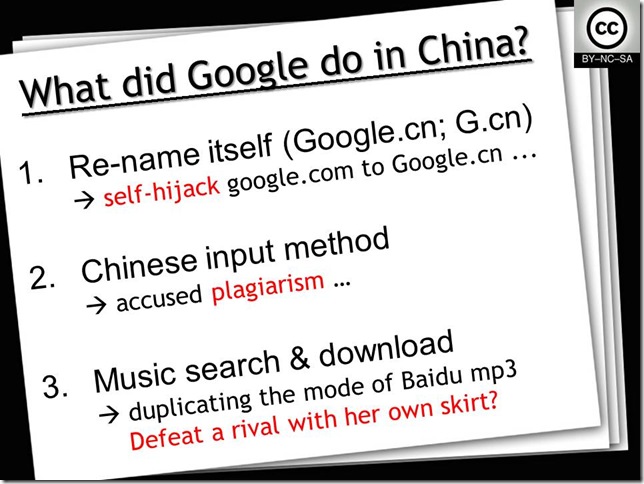
Google can hire people who understand Chinese culture. But with the strong value oriented mission setting atomosphere, Google’s headquater obviously often conflicted with its Chinese management team. The result is: Chinese Google (Google.cn) is separated from Google’s world, not because of the gov’s censorship, but because of the misunderstanding on what is a good, attractive and sustainable web service for Chinese customers.
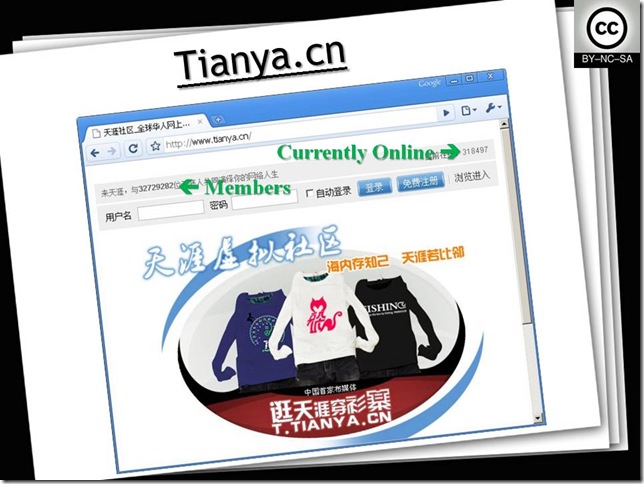
I wish the following websites may be helpful for understanding the unique enviroment of “Cinternet”. The first one is Tianya.cn. Tianya is the most popular and most crowded online forum in China. It’s traffic is ranked No. 90 in the world (Alexa). Click here for more.
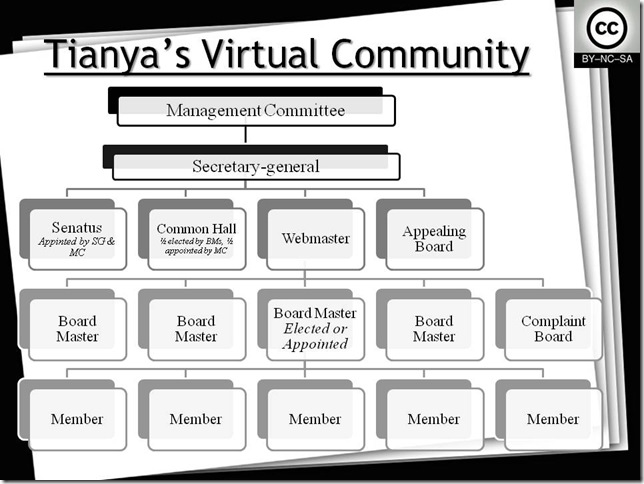
Tianya’s virtual community has a few unique features contributing to its flourish and survival: 
(1) It has a huge group of volunteer forum-board masters who are in charge of deleting/hiding the defamatory, dissenting and – most specially – inappropriate posts. The board masters are mostly the famous IDs (in many cases most of users don’t know who the people is in real world), they are famous and reliable only because of their reputation established in Tianya.
(2) The un-deletable and un-editable mechanism. No one can delete/edit his/her own posts at the forum boards, even a board master can only manage the posts at his/her board – as a user in other boards, he can do nothing but posting new threads as a normal user.
(3) If users think a board master is not appropriate, they may leave the complaint at the manage board – and if those complaints are reasonable, the higher webmaster may decide to suspend the board master’s authority – just like the mechanism of “petition” in China’s real life.
(4) Look at that strucutre map again. It’s “separation of the power” looks very like the actual life in China.

Now this is QQ.com. QQ.com is ranked the world 11th website on the matter of traffics (remember, the traffic among the QQ clients are not counted in). Contrary to Google’s matrix based on search engine and E-mail, QQ’s world is based on Instant Message. It is a close system, not providing open API.

Taobao is not a Chinese Ebay. On the contrary, Ebay’s Chinese branch has been defeated by Taobao. See the above comparision. Alipay, Taobao’s payment tool, archieved over 1.2 billion RMB (171 million USD) of the value of transactions per day on Dec 7th 2009, among its over 200 million users.
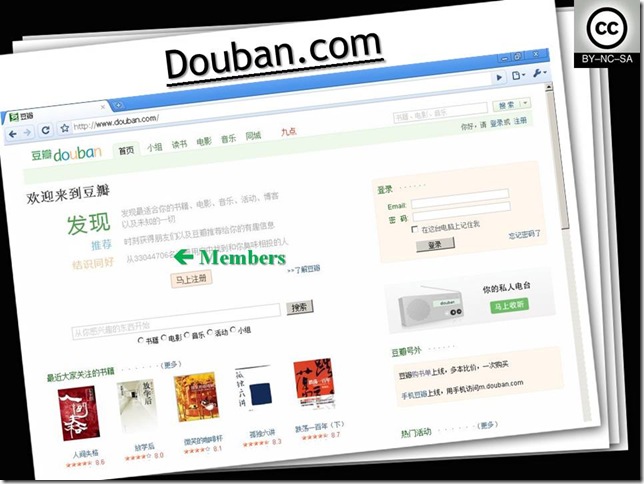
Named after a spice used in Szechuan cooking, Douban allows Chinese consumers to share, tag and browse through one another’s collection of books, music, and movies.
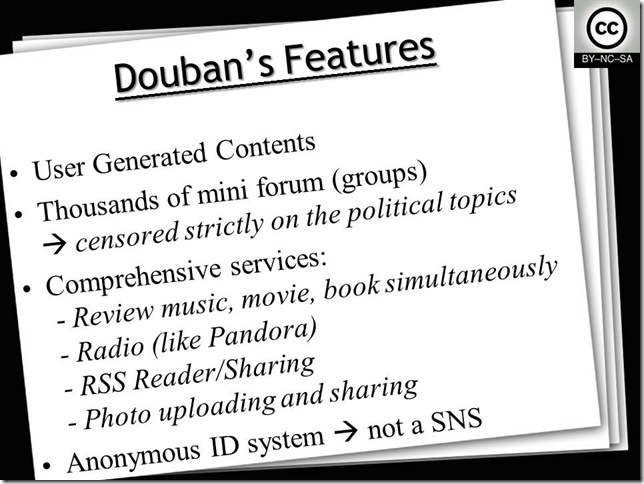
The contents in Douban are mostly user generated. However Douban is distinct from Youtube: only comments to the items (books, movies and music albums) are posted on the website. In each item’s page, Douban provides the links to the online bookstores (including Amzon’s Chinese site). The prices are easily compared in an item’s page.
Douban’s biggest distinction from the SNS (like facebook) is: it is not a real-name network. Therefore, it is mainly not for social and personal networking, but for public expression. Besides the review tab in each item’s pages, users can also establish groups and invite others join. There are thousands of groups and thousands of entries are posted every day. Because most users are in anonymous, discussions are very interest-oriented and open-hearted.
If there were no censorship, Douban might be a good platform to form a classic “public sphere”. However, douban enforces a very strict self-censorship policy. Any thread that may “threat the operation of douban in China” will be hidden (only the author can read). The groups include too much “in-harmonious” topics will be closed by douban’s staff – or be hidden and only the members of the group may read those threads. It is obvious that Douban’s operator does not want this websited be involved into any political debate.

The above is a conclusion to the features of successful websites in China. Practcially speaking, these might be useful for those who wish to invest their money and energy into the Internet industry in China.
Back again to the overall abstract discussion, the world might be flatted by emergence of the Internet, but when more and more parts of this convergence of pink, blue, black or bloody world involve themselves into the Internet, the basic feature of the inter-net as a network of various autonomous systems may be at least continue to be a existence, if not a growing trend, in the new decade. And, with all due desire to the open and equal access to the Internet, I still doubt that the vision of a “single” Internet that believe people must love facebook, twitter and Google wave could be a realist approach to archive that aim.
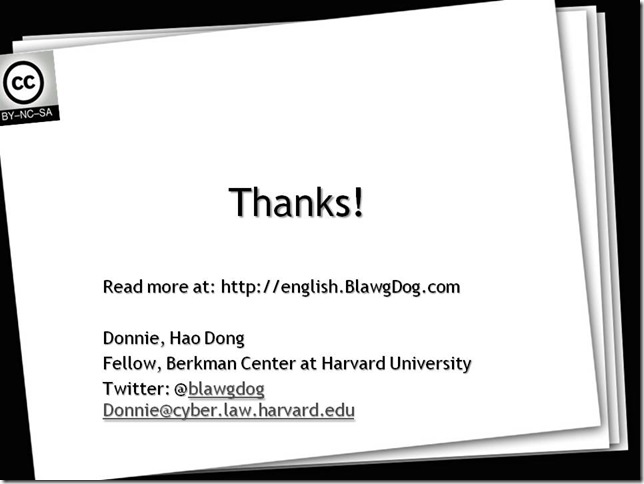
iPad is coming … Even in the same culture and society, Apple’s world can be so distinct from the PC’s world (they both connected into the Internet). Imaging how big distinction of the Cinternet’s could be.

